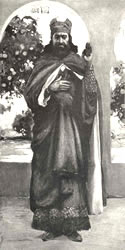Zephaniah
 The Book of Zephaniah is the ninth of the Twelve Minor Prophets, preceded by the Book of Habakkuk and followed by the Book of Haggai. Zephaniah means "Yehovah has hidden/protected," or "Yehovah hides". Zephaniah is also a male given name. Notable people with the name are actually called Zeph which is the alternate form of it/Zephyr.
The Book of Zephaniah is the ninth of the Twelve Minor Prophets, preceded by the Book of Habakkuk and followed by the Book of Haggai. Zephaniah means "Yehovah has hidden/protected," or "Yehovah hides". Zephaniah is also a male given name. Notable people with the name are actually called Zeph which is the alternate form of it/Zephyr.
The book's superscription attributes its authorship to "Zephaniah son of Cushi son of Gedaliah son of Amariah son of Hezekiah, in the days of King Josiah son of Amon of Judah" (1:1, NRSV). All that is known of Zephaniah comes from the text.
The name "Cushi," Zephaniah's father, means "Cushite" or "Ethiopian," and the text of Zephaniah mentions the sin and restoration of Ethiopians. While some have concluded from this that Zephaniah was a black Jew, Ehud Ben Zvi maintains that, based on the context, "Cushi" must be understood as a personal name rather than an indicator of nationality. Abraham ibn Ezra interpreted the name Hezekiah in the superscription as King Hezekiah of Judah, though that is not a claim advanced in the text of Zephaniah.
As with many of the other prophets, there is no external evidence to directly associate composition of the book with a prophet by the name of Zephaniah. Some scholars, such as Kent Harold Richards and Jason DeRouchie, consider the words in Zephaniah to reflect a time early in the reign of King Josiah (640-609 BC) before his reforms of 622 BC took full effect, in which case the prophet may have been born during the reign of Manasseh (698/687-642 BC). Others agree that some portion of the book is postmonarchic, that is, dating to later than 586 BC when the Kingdom of Judah fell in the Siege of Jerusalem. Some who consider the book to have largely been written by a historical Zephaniah have suggested that he may have been a disciple of Isaiah because of the two books' similar focus on rampant corruption and injustice in Judah.
If Zephaniah was largely composed during the monarchic period, then its composition was occasioned by Judah's refusal to obey its covenant obligations toward Yehovah despite having seen Israel's exile a generation or two previously - an exile that the Judahite literary tradition attributed to Yehovah's anger against Israel's disobedience to his covenant. In this historical context, Zephaniah urges Judah to obedience to Yehovah, saying that "perhaps" he will forgive them if they do.
View the Chapters of Zephaniah:
1
2
3